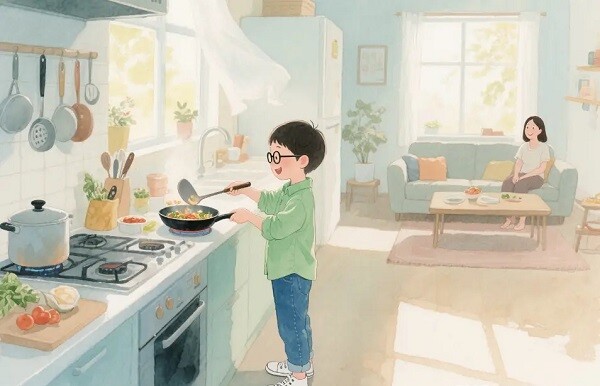

The Negative Impact of Over-Caring Parenting
Doing everything for your child will hinder their independence.
Parents who cook, tidy up, and prepare everything for their children may believe they are showing love and care. However, experts suggest that this approach could unintentionally hinder their child’s ability to become self-reliant.
When children grow up in an environment where everything is done for them, they miss out on opportunities to learn essential self-care skills. As a result, they may struggle to develop the confidence needed to navigate social situations, feeling awkward and unsure when faced with daily challenges.
Life skills are not innate but learned through experiences. Therefore, parents should encourage children to participate in tasks like cooking, cleaning, and organizing. This will help them understand the value of effort and achievement, fostering pride and a willingness to take on bigger challenges in the future.

Parental confusion leads to children’s hesitation.
“Follow my advice and choose a safe career path.”
“That person isn’t good enough for you; I’ll find someone better.”
While these statements may stem from a place of love and protection, they can have unintended consequences on a child’s development.
From an early age, children learn not to make choices but to wait for instructions. This creates a habit of relying on adult direction, leading to a lack of independent decision-making skills. Even as adults, they may struggle with important choices due to this deep-rooted habit.
By not allowing children to “try and fail,” they miss out on exploring the world and learning from their mistakes. Instead, they feel ill-equipped to face life’s challenges and may become anxious and fearful of making decisions, always seeking approval from others.


Parental criticism can make children overly sensitive.
“You’re so stupid! You can’t even do this simple task.”
“All you do is play; you’re not good at studying, so you’ll end up a garbage collector.”
These hurtful words, often spoken in anger, can leave deep wounds in a child’s psyche.
“I can’t do it.” Over time, children may internalize these beliefs, leading to a sense of incapability. They may develop a self-defense mechanism, avoiding challenges and new opportunities. Instead of facing difficulties head-on, they choose the safety of inaction to avoid further criticism.
This low self-esteem can persist throughout childhood and even impact their adult lives.

Overindulgence prevents children from learning to satisfy their own needs.
Snacks in abundance, generous allowances, and instant gratification. While parents may believe they are providing a luxurious life, they are actually hindering their children’s ability to face basic life challenges and appreciate what they have.
If children never experience the feeling of “not having,” they may struggle to understand the value of things. By not learning to save and manage money, they may face significant financial challenges in the future. When everything is readily provided, it’s difficult to feel a sense of happiness or accomplishment from achieving something through hard work.
Experts suggest that parents allow their children to experience “hunger” in both material and emotional aspects, teaching them to “find their own food.” When children must satisfy their own needs, they develop creativity, patience, and resilience.


Parents’ lazy habits can lead to children’s laziness.
If parents spend their time lounging on the sofa and browsing their phones, it’s inconsistent to expect their children to “study hard”.
It’s challenging to expect children to succeed and develop healthy habits when their parents lead chaotic lives. In reality, children are highly observant and influenced by their parents’ actions, attitudes, and behaviors.
If children see their parents being inconsistent or lazy, it will be difficult for them to form good habits and a sense of responsibility in their studies and daily lives.
True love is not about being a full-time caretaker but about fostering independent and confident individuals.
Instead, act as a “scaffolding” – provide support as they climb higher, and remove it when they stand firm. This means giving children the space to explore, make mistakes, and learn from their own experiences as they grow.


































